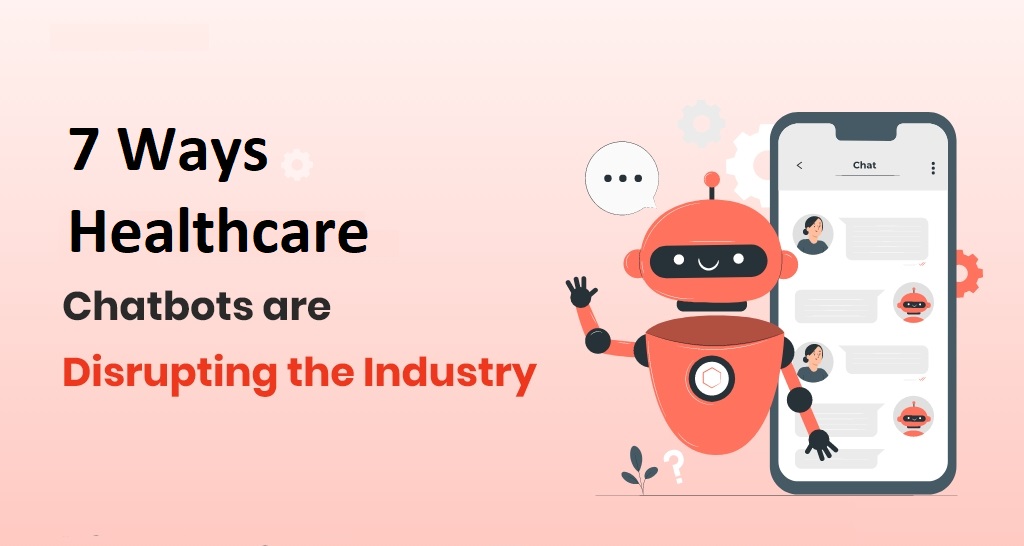
Top
Search
People also search for:
- Home
- 7 Ways Healthcare Chatbots are Disrupting the Industry


In today’s digital age, technology integration in the healthcare industry has changed the way patients and employees interact.
One such innovation is the emergence of healthcare chatbots. These advanced virtual assistants have revolutionized the industry, streamlined processes, improved patient experience, and improved overall productivity.
Capable of providing personalized care and support, healthcare chatbots have transformed the way healthcare services are delivered and accessed.
Here are seven ways these intelligent chatbots are changing healthcare landscapes:
Healthcare chatbots have redefined patient interaction by providing 24/7 support and guidance. Patients can get instant answers to their questions, personalized health reports, and even reminders for appointments and medication schedules.
This ongoing support fosters a sense of communication and trust between patients and healthcare providers, leading to greater patient satisfaction and adherence to treatment plans.
Gone are the days of long waits and tedious appointments. With a chatbot integration, patients can easily schedule an appointment, check the availability of healthcare providers, and receive timely reminders.
This streamlined approach not only reduces administrative burdens but also improves the utilization of healthcare resources, resulting in improved efficiencies and reduced patient waiting times.
With the help of health chatbots, patients can check their health in advance.
Through personalized communication tools, patients can track their vital signs, receive information about their health information, and receive personalized advice to maintain a healthy lifestyle.
By promoting self-care and encouraging proactive health care, chatbots help prevent and detect early health problems, ultimately improving health outcomes.
Equipped with state-of-the-art technology, chatbots can accurately assess patients’ symptoms and proactively perform diagnoses or recommend further medical evaluations.
This pre-assessment process accelerates the delivery of appropriate care, especially in non-emergency situations.
Allowing Healthcare Industry providers to prioritize critical issues and allocate resources appropriately.
These rapid and accurate procedures contribute to faster and more effective treatment and can ultimately save lives and improve patient outcomes.
Healthcare chatbots are important sources of reliable medical information and educational tools.
They can disseminate accurate and timely health information, including preventive measures, treatment options, and general health knowledge.
By enhancing health literacy and providing comprehensive patient information, chatbots support informed decision-making and encourage proactive health care in communities.
The integration of chatbots and telemedicine services has revolutionized telehealth care.
Patients can virtually speak with Healthcare Industry providers, discuss concerns, and receive prescriptions and treatment advice in real-time, all from the comfort of their homes.
This seamless integration not only increases access to health care, especially for those living in remote areas.
But also reduces the burden on traditional health facilities, thus sharing care resources more equally.
Healthcare chatbots generate large amounts of data that can be analyzed to identify trends, assess patient needs, and improve healthcare services.
By using data analytics and artificial intelligence, healthcare providers can gain valuable insights into patient preferences, treatment quality, and efficiency.
This data-driven approach enables continuous improvement in healthcare, resulting in personalized patient care.
In conclusion, healthcare chatbots have revolutionized the way healthcare services are delivered and accessed, offering personalized support, streamlining processes, and enhancing overall patient experiences.
Their integration with advanced technologies has not only improved the efficiency of healthcare systems but has also fostered a culture of proactive healthcare management and patient empowerment.
As the healthcare industry continues to evolve, the role of chatbots will undoubtedly become increasingly vital, shaping the future of Healthcare Industry delivery and promoting a healthier and more connected global community.
We create HIPAA-compliant healthcare software solutions.Focused on patient outcomes, data security, and efficiency.
Consult Healthcare Experts